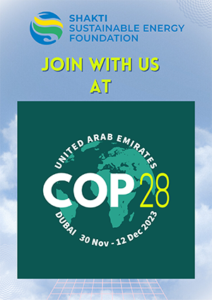
Venue: Regional Climate Foundations Pavillion- COP28 (Pavilion No – TA3-145), Blue zone– B7 and building 88 (Ground floor of building 88, left-hand side)
Date: December 3, 2023
Time: 10:00 to 11:30 GST
To join the event please register below
Register
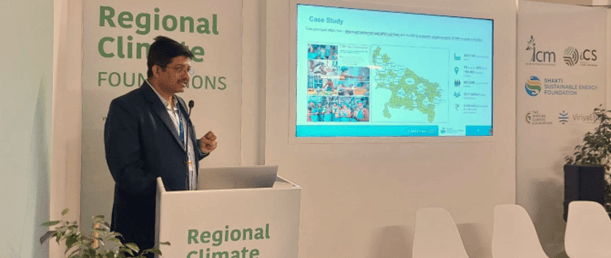
Moderator: Dr Amit Kumar Singh Parihar – Director Clean Power, Shakti Sustainable Energy Foundation: Brief opening remarks, context setting, and invites Panel members.
Objective: The event aims to delve into the dynamic intersection of women’s empowerment and decentralised renewable energy. By bringing together experts, practitioners, and advocates, the event will share success stories, facilitate knowledge exchange, and explore collective recommendations to increase women’s empowerment through decentralised renewable energy solutions in the context of sustainable development.
Topics to address/ key questions:
- Share success stories, best practices, and learnings on women’s empowerment through decentralised renewable energy solutions.
- What barriers and challenges limit women’s empowerment through DRE solutions?
- Identify a set of recommendations/ strategies related to policy advocacy, project implementation, and community engagement for enhancing women’s roles in the renewable energy sector.
- What role philanthropies and CSOs can play in addressing this need
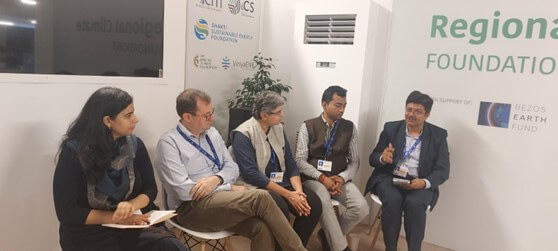
Dr Amit Kumar Singh Parihar delved into the crucial theme of ‘Women Empowerment through Decentralised Renewable Energy (DRE) Solutions.’ The event sought to navigate the dynamic intersection of women empowerment and decentralised renewable energy.
The side event touched the aspects of achieving women’s empowerment through decentralised renewable energy (DRE), addressing key points such as:
- Success stories, best practices, and learnings on women’s empowerment.
- Barriers and challenges limiting women’s empowerment through DRE solutions.
- Identification of a set of recommendations/ strategies related to policy advocacy, project implementation, and community engagement for enhancing women’s roles in the renewable energy sector.
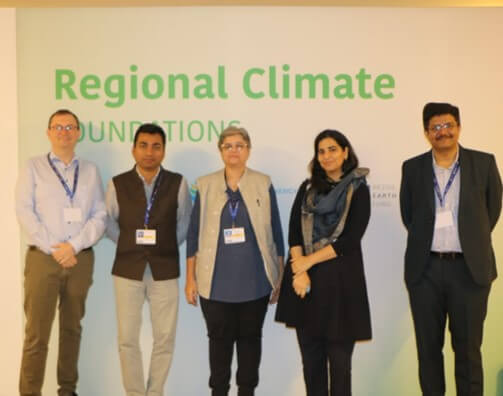
Panellists:
- Ms Priyadarshini Karve, CEO – CLEAN – India Confirmed
- Mr Amit Khare, Program Manager Sequoia Foundation
- Ms Kanika Verma – DA – TBC
- Mr Philip Gass, Director, Just Transition, International Institute for Sustainable Development
Panel Round 1:
Amit asks questions to panellists – Providing briefs of their organisation and the work they have been doing on women empowerment / Their perspective on the importance of women empowerment in the energy transition journey. Follow-up questions to panellists in the following order
Following sequence to be followed:
- Ms Kanika Verma
- Mr Philip – IISD (Specialised question)
- Ms Priyadarshini Karve, CEO – CLEAN
- Mr Amit Khare
- Any other confirmed panellist
Panel Round 2:
In the second round, overall focus is on discussing few of the success stories (things that have worked)/ the key barriers and challenges / Specific factors related to women empowerment. Questions are to be asked in the same order. Following are the few suggestive questions in this regard.
- Ms Kanika Verma:
-Please share any of the success story
-What challenges (Based on your ground experience) do you perceive in fostering women’s empowerment through DRE solutions, and how have you tackled these challenges in your organisations?
-How did you navigate these challenges? - Mr Philip Gass:
-Elaborate on specialised challenges hindering women’s empowerment in the DRE sector in other countries where you have worked
-Please discuss a few of the success stories which you think can be replicated in other countries. - Ms Priyadarshini Karve:
-What key barriers and challenges (particularly on the policy front) have you encountered hindering women’s empowerment through decentralised renewable energy (DRE) solutions?
-Can you share insights into how CLEAN has navigated these challenges and any innovative solutions that have been implemented or proposed?
-How can civil society organisations collaborate more effectively to overcome shared challenges and maximise their impact in this sector? - Mr Amit Khare:
-What are the key challenges (from a Philanthropy point of view) in enhancing women’s empowerment?
-What role do philanthropy organisations play in overcoming challenges to women’s empowerment in the DRE sector?
-Highlight successful philanthropic initiatives and how they can be scaled up.
Panel Round 3:
In the third round, the overall focus is on arriving at a set of recommendations on various aspects related to policy, financing, institutional building, and social aspects that need to be considered in program designing to enhance women’s empowerment. Follow-up questions to panelists in the following order
- Ms Kanika Verma:
-Final set of recommendations to achieve a large-scale transformation
-From a civil society perspective, what policy advocacy strategies have proven successful in creating an enabling environment for women in the renewable energy sector?
-How can project implementation strategies be tailored to ensure maximum community participation, especially focusing on women? - Mr Philip Gass:
-Based on your experience/learnings in other countries, what specific set of recommendations would you like to make?
-In your view, what policy advocacy approaches can effectively address gender disparities and enhance women’s roles in the renewable energy sector on an international scale?
-Based on your expertise, what strategies can be implemented at the project level to ensure active participation and empowerment of women? - Ms Priyadarshini Karve:
-In your experience, what policy advocacy strategies have proven effective in promoting women’s roles in the renewable energy sector?
-Could you suggest community engagement practices that CLEAN has found successful in enhancing women’s participation in renewable energy projects?
-How can we strengthen the on-ground implementation by capacitating the on-ground organisations? - Mr Amit Khare:
-Based on your experience, what recommendations you would like to make to enhance women’s empowerment?
-How can philanthropic organisations collaborate with project implementers to ensure effective community engagement and sustainable impact on women’s roles?
-Any specific recommendations /expectations from other stakeholders to have more involvement in philanthropic organisations.
Role of Philanthropies and CSOs:
Quick Q&A Round and Chair’s Closing Remarks (20 mins):
Amit opens the stage for a quick question-answer round.
Mr. Koyel Mandal – Shakti Sustainable Energy Foundation): Makes concluding remarks, summarising key messages, and invites continued efforts and dialogue.
Speaker’s bios
Ms. Priyadarshini Karve, CEO, Clean Energy Access Network (CLEAN)
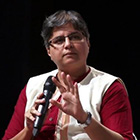 Dr. Priyadarshini Karve, CEO of Clean Energy Access Network (CLEAN), boasts a 20+ year career marked by groundbreaking contributions to sustainable living. Founder of Samuchit Enviro Tech, she pioneered innovative biomass-burning cooking devices, reducing kitchen smoke and firewood dependence in rural areas. As Managing Director of Samuchit, she introduced the user-friendly Samuchit Carbon Footprint Calculator. Actively engaged in international organisations, Dr. Karve leads projects in renewable energy, sustainable development, and pro-poor carbon finance. A respected educator at Symbiosis International University, she’s also a co-editor of ‘Shaikshanik Sandarbh’ and has earned prestigious awards, including the World Technology Award 2005 and Sahyadri Hirkani Award 2011.
Dr. Priyadarshini Karve, CEO of Clean Energy Access Network (CLEAN), boasts a 20+ year career marked by groundbreaking contributions to sustainable living. Founder of Samuchit Enviro Tech, she pioneered innovative biomass-burning cooking devices, reducing kitchen smoke and firewood dependence in rural areas. As Managing Director of Samuchit, she introduced the user-friendly Samuchit Carbon Footprint Calculator. Actively engaged in international organisations, Dr. Karve leads projects in renewable energy, sustainable development, and pro-poor carbon finance. A respected educator at Symbiosis International University, she’s also a co-editor of ‘Shaikshanik Sandarbh’ and has earned prestigious awards, including the World Technology Award 2005 and Sahyadri Hirkani Award 2011.
Mr. Amit Khare, Program Manager – Sequoia Foundation
 Amit Khare is a program manager at Sequoia Climate Foundation, where he develops grant-making strategies to accelerate the energy transition and climate action in India. Amit has spent more than 15 years working on global clean energy and climate-change mitigation, including with government agencies, private-sector companies, and nonprofits. Most recently, he was part of the ICF’s energy efficiency analytics team supporting North American utilities. Amit also managed multilateral and bilateral funded energy efficiency programs in South Asia and Africa. Amit has an undergraduate degree in electrical engineering from India and a graduate degree in environmental systems from Humboldt State University in California.
Amit Khare is a program manager at Sequoia Climate Foundation, where he develops grant-making strategies to accelerate the energy transition and climate action in India. Amit has spent more than 15 years working on global clean energy and climate-change mitigation, including with government agencies, private-sector companies, and nonprofits. Most recently, he was part of the ICF’s energy efficiency analytics team supporting North American utilities. Amit also managed multilateral and bilateral funded energy efficiency programs in South Asia and Africa. Amit has an undergraduate degree in electrical engineering from India and a graduate degree in environmental systems from Humboldt State University in California.
Ms. Kanika Verma, Director, Indian Micro Enterprises Development Foundation
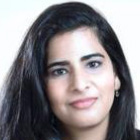 Kanika Verma, leading the Green and Inclusive Entrepreneurship vertical at Development Alternatives Group, is also a Director of the Indian Micro Enterprises Development Foundation. A passionate advocate for social innovation and system change, Kanika actively contributes to grassroots initiatives and global discussions on inclusive innovation, entrepreneurship, and the future of work. As the co-founder of Systems Play, a collaboration platform for system innovators, she emphasises collaboration, experimentation, and learning. Additionally, she spearheads the “Work 4 Progress” program, supported by the la Caixa Banking Foundation, focusing on entrepreneurship-driven job creation for women and youth. With a background in leading a U.S.A.-based financial investment firm for seven years, Kanika transitioned to her role at Development Alternatives Group in 2011, aligning her career with her aspiration to be a social entrepreneur.
Kanika Verma, leading the Green and Inclusive Entrepreneurship vertical at Development Alternatives Group, is also a Director of the Indian Micro Enterprises Development Foundation. A passionate advocate for social innovation and system change, Kanika actively contributes to grassroots initiatives and global discussions on inclusive innovation, entrepreneurship, and the future of work. As the co-founder of Systems Play, a collaboration platform for system innovators, she emphasises collaboration, experimentation, and learning. Additionally, she spearheads the “Work 4 Progress” program, supported by the la Caixa Banking Foundation, focusing on entrepreneurship-driven job creation for women and youth. With a background in leading a U.S.A.-based financial investment firm for seven years, Kanika transitioned to her role at Development Alternatives Group in 2011, aligning her career with her aspiration to be a social entrepreneur.
Mr. Philip Gass, Director, Energy Program, Just Transitions and Canada, IISD
 Philip is a Director in the (International Institute for Sustainable Development) IISD Energy program leading just transition and Canada workstreams. He is and experienced Sustainability Analyst and Project Manager with a demonstrated history of working with governments, the private sector, and non-governmental organisations. His recent focus has been on the development of fiscal policy approaches that facilitate GHG mitigation, including carbon pricing and subsidy reform. Philip also works directly on economic approaches that promote sustainability, including the green economy, circular economy, and just transitions. Internationally and in Canada, his work focuses on the impacts of the transition from coal, oil, and gas to renewable energy, ensuring policy plans are equitable and inclusive. He has a background in political economy and stakeholder engagement, having worked in a legislative setting in Canada prior to joining IISD.
Philip is a Director in the (International Institute for Sustainable Development) IISD Energy program leading just transition and Canada workstreams. He is and experienced Sustainability Analyst and Project Manager with a demonstrated history of working with governments, the private sector, and non-governmental organisations. His recent focus has been on the development of fiscal policy approaches that facilitate GHG mitigation, including carbon pricing and subsidy reform. Philip also works directly on economic approaches that promote sustainability, including the green economy, circular economy, and just transitions. Internationally and in Canada, his work focuses on the impacts of the transition from coal, oil, and gas to renewable energy, ensuring policy plans are equitable and inclusive. He has a background in political economy and stakeholder engagement, having worked in a legislative setting in Canada prior to joining IISD.


